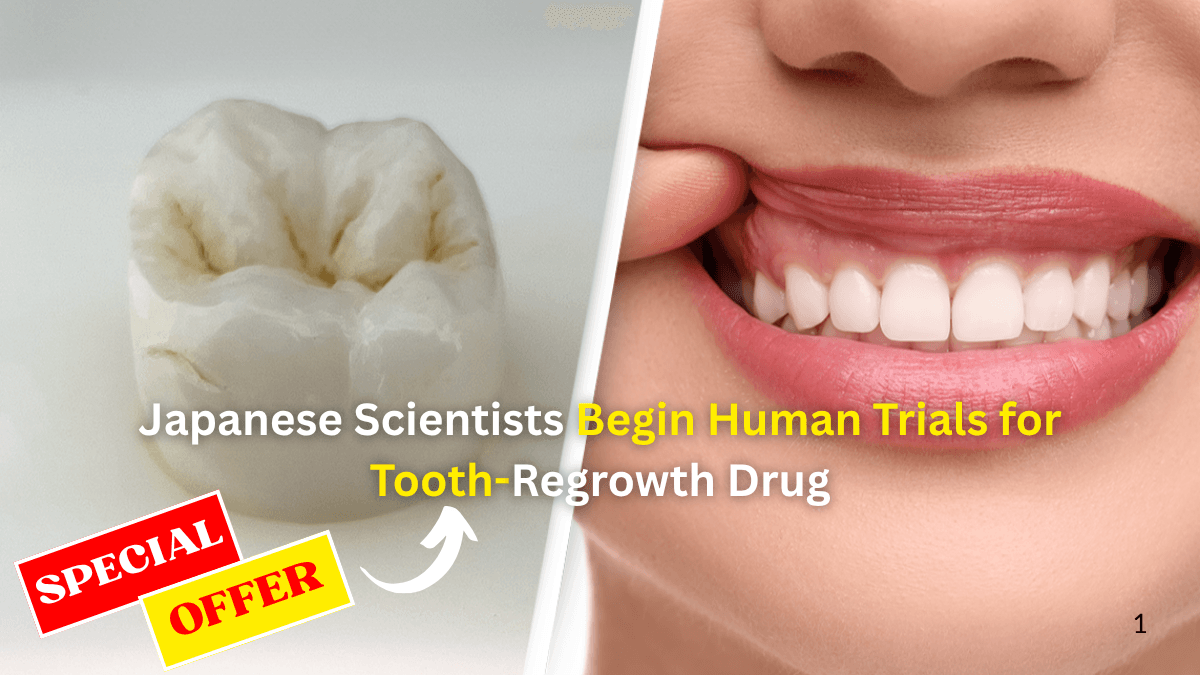Human Trials for Tooth:- Japanese dental researchers have launched the world’s first clinical trial of a novel drug designed to stimulate the growth of a third set of teeth—a potential game‑changer for people missing teeth due to genetic conditions, decay, or injury. (japandaily.jp, cleveland13news.com)
🧬 The Science of Regeneration
- The drug targets a protein called USAG‑1, which normally suppresses tooth development. By blocking USAG‑1, dormant third‑generation tooth buds—hidden beneath our gums—are reactivated. (cleveland13news.com)
- Earlier tests in animal models like mice and ferrets showed successful regrowth of fully formed teeth when injected with the drug. These studies reported no significant side effects. (newatlas.com)
📅 Trial Timeline & Scope
- Phase 1a, launched in October 2024 at Kyoto University Hospital, involves 30 healthy male participants (ages 30–64) missing at least one molar. This phase focuses exclusively on safety and dosing, not efficacy. (dentalreach.today)
- Pending safety results, a Phase 1b trial is planned for children (ages 2–7) with congenital tooth agenesis—a condition affecting ~0.1% of the population who are born missing multiple teeth. (dentalreach.today)
- Later trials may include older adults missing teeth due to environmental factors, such as decay or injury. (dentalreach.today)
Read More:- Top 20 New OTT Releases Movies (July 2025) You Can’t Miss – Latest Streaming Guide
🎯 Why It Matters
- Current solutions for missing teeth—dentures and implants—can be costly, uncomfortable, and physically invasive. Natural tooth regrowth could offer a more seamless, long-lasting, and biocompatible alternative. (globalnews.ca)
- A successful treatment could dramatically improve quality of life for patients across all age groups—especially children born with congenital tooth loss and seniors experiencing age-related tooth loss.
🧑🔬 Expert Reactions
- Dr. Katsu Takahashi, head of the project at Kitano Hospital, describes the work as “a completely new technology to the world” and expressed that he’d be “over the moon” if adult participants begin showing tooth regrowth. (uniqa.dental, cleveland13news.com)
- Professor Angray Kang from Queen Mary University of London praised the Japanese team for leading the field and noted that a similar antibody used to treat osteoporosis has a nearly identical mechanism—adding confidence to the approach. (cleveland13news.com)
- However, Dr. Chengfei Zhang from the University of Hong Kong cautioned that animal model results don’t always translate to humans and that functional and aesthetic outcomes must be proven. (cleveland13news.com)
📆 Looking Ahead: Commercial Release by 2030?
If clinical trials progress smoothly, researchers hope to have an approved, market‑ready drug by 2030. (engadget.com) The long‑term vision includes:
- Treating childhood congenital tooth agenesis.
- Regenerating teeth lost due to decay or injury in adults.
- Expanding access to natural tooth regrowth globally.
🌍 Why Japan Leads the Way
Japan, with one of the world’s oldest populations, faces increasing demand for innovative dental care—over 90% of Japanese aged 75+ are missing at least one tooth. Regenerative medicine like this could significantly extend healthy life expectancy by enabling better oral health. (cleveland13news.com, profolus.com, medicalxpress.com)
✅ Summary Table
| Phase | Participants | Goal |
|---|---|---|
| Phase 1 | 30 adult males (30–64 years) | Safety & dosage |
| Phase 2 | Children (2–7 years) with agenesis | Efficacy in congenital cases |
| Phase 3 | Adults with lost teeth | Efficacy in general cases |
| Commercial | Wide public use by ~2030 | Market release |
✨ Final Thoughts
This tooth‑regrowing drug marks an exciting leap in dental treatment. By awakening dormant regenerative processes in the human jaw, it could one day replace artificial solutions and dramatically improve oral health across diverse populations.

